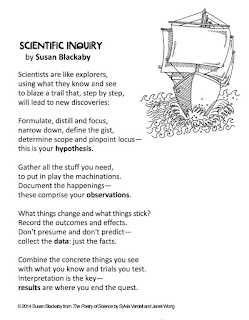The Poetry of Science: The Poetry Friday Anthology for ScienceWhether you want to take a moment to observe the way a hawk glides or predict what happens when you soak celery in food dye, these poems offer a short, focused crystallization of scientific observation and inquiry. Here's a great poem to start us off: "How to Be a Scientist" by Amy Ludwig VanDerwater.
edited by Sylvia Vardell & Janet Wong
illustrated by Frank Ramspott and Bug Wang
Pomelo Books, 2015
teacher's edition
Amazon
ages 4-10
 |
| How to Be a Scientist by Amy Ludwig VanDerwater |
- What Do Scientists Do?
- Ask & Investigate
- Science Fair
- Kitchen Science
- Push & Pull
- Water, Water, Everywhere
- Earth & Sun
- Ecosystems
- Endangered & Extinct
- Think It, Build It, Make It
Definitely check out the Poetry for Children Blog this month. Sylvia Vardell is sharing science and poetry resources all month long. Each day, she is sharing a poem, pairing it with a nonfiction picture book, and providing Take 5 activities.
Explore some of their resources on the Pomelo Books Pinterest page. Here is one of my favorite poems, Spiral Glide by Mary Lee Hahn, and the Take 5 activities that accompany it.
On Facebook, the folks at Science Friday shared this delightful poem movie to highlight the scientific inquiry. Notice how poet Susan Blackaby introduces students to academic, scientific words like hypothesis, observation, data and results -- but she does so with rhyme and rhythm.
The review copies were kindly sent by the publishers. If you make a purchase using the Amazon links on this site, a small portion goes to Great Kid Books. Thank you for your support.
©2016 Mary Ann Scheuer, Great Kid Books






Thank you for this fabulous review, Mary Ann Scheuer--love that you share our belief in Poetry + Science as perfect partners!
ReplyDeleteJanet, thank YOU for such a wonderful book, filled with so many poems and great ideas.
DeleteI agree with Janet-- what a lovely post and shout-out to science poetry and heaps of resources. (I'm especially honored by the nod to my blog, too!) Thank you for your support and all your great work for kids, teachers, and libraries!
ReplyDeleteSylvia, I have LOVED your Take 5 ideas and all the different ways you help teachers engage kids with poetry. Thank you for all of your resources!!
DeleteThanks for featuring my poem! My students have noticed that there are a lot of hawks in my poems!!
ReplyDeleteAnd now every time I see a hawk soaring overhead, I'm going to think of you and smile.
DeleteIt is an honor to find my poem among these others from this great book here at Great Kid Books. Sylvia and Janet are forces of Poetry and Science! xx
ReplyDeleteAmy, I love how you distill big ideas down into bite-size chunks. Isn't it great how much poetry and science share in common?!
Delete